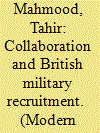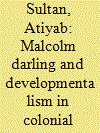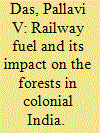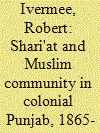|
|
|
Sort Order |
|
|
|
Items / Page
|
|
|
|
|
|
|
| Srl | Item |
| 1 |
ID:
146836


|
|
|
|
|
| Summary/Abstract |
This article examines the ways in which rural elite collaborators mobilized recruits for the British Army during the First World War. It thus not only increases knowledge of Punjab's military history, but adds to the understanding of collaboration as a process involving competitive groups in which elites manipulated the process for their own ends. The case study material drawn from the Shahpur district of the colonial Punjab argues that while there may have been a degree of indoctrination into the colonial state's values, it was mainly the desire to use its patronage to bolster family influence or to transform local hierarchies that was the key factor in securing willing collaborators. The competition for local power and influence provided a local dynamic to the collaborative process. The state could of course take advantage of this competition to serve its interests, just as the Punjabi tribal chiefs could utilize state patronage to beat off rivals to their power. Collaboration was thus a dynamic two-way process, rather than, as it is often portrayed, a top-down, one-way relationship.
|
|
|
|
|
|
|
|
|
|
|
|
|
|
|
|
| 2 |
ID:
158843


|
|
|
|
|
| Summary/Abstract |
This article studies the career and writings of Sir Malcolm Darling to make three main claims. First, an intellectual genealogy of development studies is presented through the examination of close parallels between colonial efforts at rural welfare and post-colonial prescriptions for the same. Darling was central in the British efforts in Punjab to formulate ideas of reform from below or thrift among the peasantry, both of which remain popular in contemporary theories of community development and microfinance respectively. The similarities between colonial and post-colonial reforms are striking because the colonial experience remains largely forgotten. This intellectual amnesia serves a political end by blaming the peasant for his poverty and redemption from the same. Simultaneously, any structural or revolutionary social change is avoided. Secondly, the article probes the exaggerated focus on indebtedness and the political interests this served. Indebtedness gave the Unionists in Punjab political legitimacy, and the colonial state formulated solutions for the problem that did not tax its resources, for example the cooperative movement was designed to be self-financing. Finally, the article speaks to the themes of this issue by challenging the assumption that ‘institutions’ alone are a legacy of colonial rule and developmentalist reform is a post-colonial preoccupation of independent states. By presenting a case study of attempted economic and institutional reform during colonial rule, it allows one to appreciate the close, contemporaneous connections between colonial modes of governance and current modes of development.
|
|
|
|
|
|
|
|
|
|
|
|
|
|
|
|
| 3 |
ID:
121953


|
|
|
|
|
| Publication |
2013.
|
| Summary/Abstract |
This paper offers a gendered perspective to British domination in India through the British Indian Army-which in many ways was central to their entire structure of economic and political domination in India. Locating its understanding drawn from the political economy of south-east Punjab, it argues that the designated martial castes and military recruitment structurally and ideologically identified with and privileged those trends of existing masculinities in this region which suited their power structure and empire building. It was a constellation of marital caste status, land ownership, dominant caste syndrome and good bodily physique or physical strength that ideologically came to connect and configure dominant masculinity in colonial Punjab. An Army profession fully supported it. During the two world wars it emerged as the militarized masculinity, amply supported by legal and administrative measures introduced or apparently adopted in deference to certain popular cultural practices. The associated economic and political privileges turned 'loyalty' into an inherent and special ingredient of 'masculinity' which the nationalists had to confront and deal with till such times that it came to be firmly linked with nationalism and patriotism.
|
|
|
|
|
|
|
|
|
|
|
|
|
|
|
|
| 4 |
ID:
121983


|
|
|
|
|
| Publication |
2013.
|
| Summary/Abstract |
Recent studies have stressed the need for micro-histories of the environment so that important differences and similarities at local, regional and national level might be revealed. This paper analyses the process and patterns of environmental degradation at regional level by taking the case of deforestation in colonial Punjab by studying its implication at the level of empire. More specifically, it examines three aspects of how the operation and expansion of railways from 1869 to 1884, a peak period of railway expansion, affected the forests of the Punjab's plains. First, the paper analyses the reasons for large-scale railway expansion in the Punjab by discussing spatial and temporal expansion. Secondly, the impact of the railway firewood demand on the Punjab's forests between 1860 and 1884 is examined, specifically, the conditions that facilitated the increased dependence of the railways on firewood. Next follows an examination of the temporally varying nature of deforestation, given that railway firewood demand was determined by railway line openings. This section also includes a discussion on the nature of the colonial state response to the deforestation crisis and its role in maintaining the fuel supply to the railways. Finally, in the context of deforestation in the Punjab, the paper discusses how and why railway fuel changed from firewood to coal.
|
|
|
|
|
|
|
|
|
|
|
|
|
|
|
|
| 5 |
ID:
132967


|
|
|
|
|
| Publication |
2014.
|
| Summary/Abstract |
This paper argues that concerns for the government appointment of qazis, officers for the administration of Muslim law, and the greater application of shari'at critically shaped Muslim community formation in later nineteenth century Punjab. Between 1865 and 1885, Punjabi Muslim elites attested the necessity of qazis being appointed by government and Muslim law being administered in the colonial judicial system. With the support of Gottlieb Leitner, registrar of the Punjab University College, Muslim parties used the emergent associations of Punjab civil society, including the Anjuman-i-Punjab (Lahore) and Anjuman-i-Islam (Lahore), to assert the indispensability of religious law. In doing so, they challenged the Anglo-Indian decision to prioritize customary law in the Punjab and advanced the religious group as the basic social unit of Punjab society. In Punjab public spaces, the relevance of Islam was proclaimed, challenging the professed Anglo-Indian distinction between private and public, religious and secular spheres. However, demands for qazi appointment and the administration of shari'at problematize well-rehearsed arguments about the relationships between family, community, state and religion in colonial Punjab. Only through an enquiry into the two decades after 1865 may later political campaigns for the application of shari'at be understood.
|
|
|
|
|
|
|
|
|
|
|
|
|
|
|
|
|
|
|
|
|